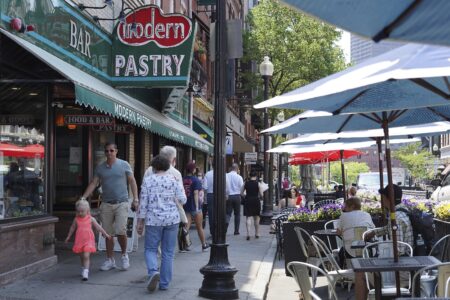Now that spring has finally arrived in Boston, perhaps you’ve been dreaming of sipping on an Aperol spritz in the late-afternoon sunlight as you eye the Hanover Street foot traffic to determine if the line at Mike’s Pastries is worth waiting in.
Consider those dreams crushed. This summer the office of Mayor Michelle Wu has once again barred outdoor dining in Boston’s North End.
The outdoor-dining initiative across the city began in 2020 to placate restaurant owners struggling from later debunked COVID mandates. Once restaurants and residents got a taste of the European-esque experience, it was hard to return indoors, at least if the weather was pleasant and warm.
Outdoor dining continued without much of a hitch in 2021. But the summer of 2022 brought with it fines for the mom-and-pop restaurants in Boston’s historically Italian neighborhood—a flat fee of $7,500, plus $480 per parking spot used.
If the rest of the city was hit with the same stringent deterrents, one could argue, justifiably, that Mayor Wu’s administration is merely Draconian. But throughout the rest of the city, permits cost $199 and $399 per month for food and drink, respectively. And restaurants in the other 21 wards can apply for outdoor dining permits. So one may now argue, justifiably, that Mayor Wu is discriminating against one neighborhood, in one ward.
Fast forward to 2024. The North End, which does not even encompass all of Ward 3, is barred from open-air dining entirely for the second summer in a row.
Jorge Mendoza, owner of the Monica’s group, joined the Howie Carr Show to describe this year’s plight.
“We want to participate in the summer economy like everybody else in the city. The administration has chosen to attack the North End,” Mendoza said. “We’re trying to get to the bottom of it and find out why.”
If the name “Mendoza” rings a bell, that’s because Jorge and his brothers appeared on Mayor Wu’s “vocal critic” (political hit) list sent to the Boston Police Department and leaked last July.
Jorge Mendoza and his compatriots held a rally last week outside Vinteco di Monica to protest the decision. Banners were hung across several North End streets, reading, “For outdoor dining reservations in the North End call City Hall at 311!”
311 is the phone number for non-emergency City services. The narrative out of Wu’s office is that 311 had received far too many calls about trash piling up in the narrow streets of the North End, and that’s why outdoor dining is a no-go.
The very altruistic Wu administration is “doing its best” to balance the views of 100 restaurants with the well-being of 11,000 neighborhood residents. Or so they say.
Mendoza’s website, DefendtheNorthEnd.com, notes that Hanover Street is nowhere near the narrowest in Boston. (Acorn Street on Beacon Hill is the narrowest, but even Newbury Street is more constricted than Hanover.)
Have you ever tried finding parking on Newbury Street on any given afternoon? Fuhgeddaboudit.
Nevertheless, you can grab a bite al fresco this summer at one of Newbury Street’s many upscale brunch spots, no problem.
Another point made on the site is that there have not been significantly more phone calls to 311 about North End trash issues than in any other neighborhood. A petition, which has garnered 483 signatures, reads:
“The North End businesses are suffering from a lack of outdoor seats and the devaluation of their indoor seats when the rest of the City of Boston is flooded with extra seats outdoors.”
The opportunity for fewer tables in North End restaurants from May 1 through Halloween will eventually depress real-estate values in the district.
But it gets worse. Wu’s administration promises to make it easier for returning businesses to take part in the outdoor-dining program through streamlined application for those previously approved.
According to the press release, these grandfathered eateries will receive outdoor dining consultations, accessible design templates, office hours, site visits, and more. The North End is already years behind the program.
Even the Boston Globe has noted the disparity, weighing in on the side of dining all’aperto and brainstorming ways for the city to compromise with the Italian owners.
Hanover Street could be closed from car traffic some peak summer weeks, or outdoor dining could take place in some parts of the day, but not all. Boston could redirect traffic—namely rideshare vehicles—to the edges of the neighborhood, or the city could provide more trash barrels or crossing guards.
You would think the Boston City Council, so rabid to increase MBTA traffic, would take a break from designing intricate congestion-tax algorithms to work in favor of modeling Boston’s Little Italy after Big Italy — heavy on foot traffic and relatively car-free.
And just think of the positive environmental impact outdoor dining could have in the North End! Why is Mayor Wu keeping Boston from going green?
“A city and mayor that prides itself on working continuously to serve every neighborhood and building community still will not work together with us,” Bill Galatis, a co-owner of Tresca Restaurant, told Channel 7. “This lack of consideration borders on willful ignorance.”
DefendtheNorthEnd.com puts it simply:
Q. Should we have outdoor dining?
A. Yes, because it’s better that way.


